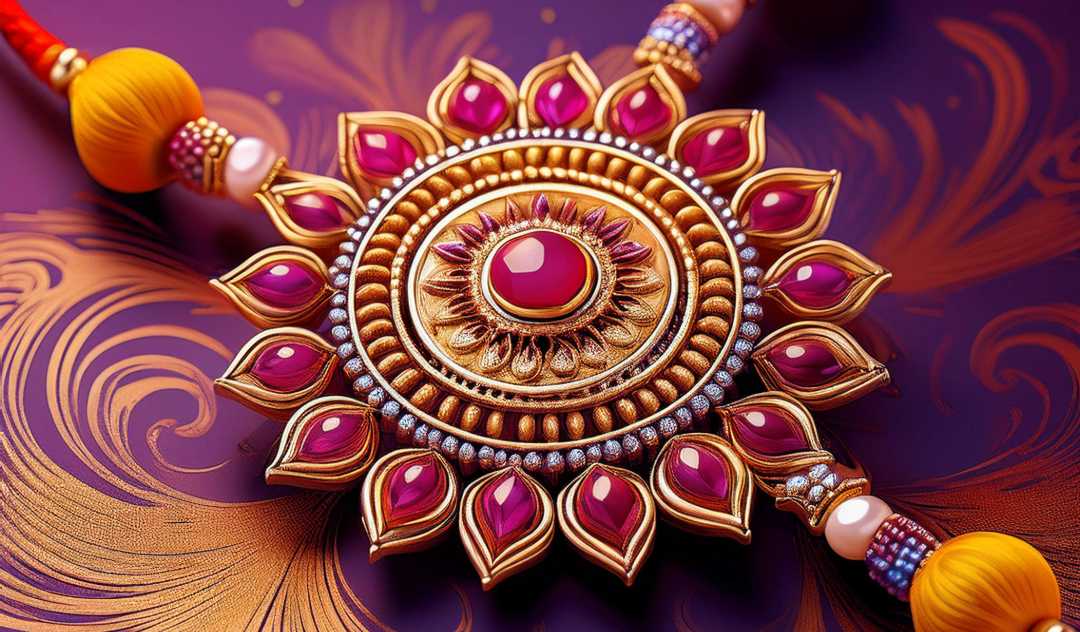Home News Special Occations Rakshabandhan: A Celebration of Love, Protection and Tradition
19 August, 2024

Rakhi, a simple yet symbolic thread, is the centerpiece of Rakshabandhan celebrations. It represents a sister's love and prayer for her brother's well-being and a brother's pledge to protect him throughout his life.
Symbolic Rakhi: More than Just a Thread
Traditionally, Rakhis were simple cotton threads, but over time, they have evolved into intricate designs adorned with beads, stones and other embellishments. Despite these changes in appearance, the underlying sentiment remains the same – a commitment to each other's safety, happiness and prosperity.
The act of tying Rakhi is accompanied by rituals that include applying tilak (a mark made of sandalwood, kumkum or turmeric) on the brother's forehead, performing aarti (a ritual of worship), and offering sweets. In return, the brother gives a gift to his sister as a symbol of his love and promises to stand by her in every situation.
Historical Significance: Legends That Define Rakshabandhan
The origins of Rakshabandhan are deeply rooted in Indian mythology and history, with many legends contributing to its significance. One of the most popular stories is from the Mahabharata, where Draupadi ties a strip of her sari around the wrist of Lord Krishna to stop bleeding from a wound. Touched by this gesture, Krishna vows to protect her, which he fulfills during the infamous disrobing incident in the Kaurava court.
Another legend involves Queen Karnavati of Mewar and the Mughal emperor Humayun. Facing military threat, Queen Karnavati sent a rakhi to Humayun, asking for his safety. Despite their religious differences, Humayun respected the sentiment behind Rakhi and came to his aid. This story highlights the power of Rakhi as a symbol of trust and protection, transcending personal, political and religious boundaries.
Cultural Fabric of Rakshabandhan
Rakshabandhan is not a festival limited only to the bond between brothers and sisters; this extends to relationships built on trust and mutual respect. In some areas, women tie Rakhi to male friends and neighbours, symbolizing the bond of brotherhood. This broadens the appeal of the festival, making it a celebration of universal brotherhood.
In modern times, Rakshabandhan has also adapted to the changing dynamics of society. With the advent of social media and online shopping, people separated by distance can send Rakhi and gifts to their loved ones across the world. This evolution of the tradition demonstrates the adaptability of the festival while maintaining its core values.
Rakshabandhan in Contemporary Times
Like many traditional festivals, Rakshabandhan has also evolved to reflect contemporary values and lifestyle. In urban areas, where nuclear families are more common and siblings live far apart, this festival has been adapted to ensure that the bond between brothers and sisters remains strong. The use of technology, such as video calls and e-commerce platforms, allows families to celebrate the festival even when they are physically apart.
The commercialization of Rakshabandhan has also introduced a variety of Rakhis and gifts keeping in mind different tastes and preferences. From designer rakhis to eco-friendly rakhis made from organic materials, the market offers a wide range of options. Despite this commercialization, the essence of the festival remains intact – Rakhi still symbolizes love, protection and the deep bond between brothers and sisters.
Additionally, the festival has seen changes in traditional gender roles. In some modern families, sisters are also playing the role of protectors, tying Rakhi to their brothers with the promise of mutual support and care. This shift reflects a broader social change towards gender equality and recognition of women as equal partners in all aspects of life.
Emotional and Psychological Impact of Rakshabandhan
Rakshabandhan is not just a ritualistic celebration; it has a deep emotional and psychological impact on those who participate. For siblings, it is a time to reflect on their relationship, acknowledge their bond, and reaffirm their commitment to each other. This festival provides an opportunity to express love, overcome differences and strengthen family bonds.
For parents, Rakshabandhan is a reminder of the importance of maintaining the bond between their children. It is a day when families come together, share stories and create memories that last a lifetime. The sense of belonging and security that comes from these gatherings contributes to the emotional well-being of all family members.
In the broader context, Rakshabandhan promotes a sense of community and social harmony. By extending the Rakhi tradition to friends, neighbors and even strangers, the festival promotes the values of togetherness, compassion and respect for others. In a world where social divisions often lead to conflict, Rakshabandhan is a reminder of the power of unity and the importance of protecting and caring for each other.
Conclusion: Rakshabandhan's Timeless Relevance
Rakshabandhan is a festival that has stood the test of time by evolving with the changing social norms while maintaining its core values of love, protection and duty. Its relevance in contemporary times lies not only in its cultural significance but also in its ability to bring people together crossing the barriers of distance, religion and social status.
In a world where individualism often trumps communal relations, Rakshabandhan is a powerful reminder of the strength of family bonds and the importance of nurturing these relationships. The enduring appeal of the festival lies in its simplicity and the universal values it celebrates, making Rakshabandhan a day of happiness, togetherness and mutual respect.
As we grapple with the complexities of modern life, the traditions and values embodied in Rakshabandhan provide a timeless source of inspiration. Whether through tying Rakhi, sharing food, or simply spending time with loved ones, the festival encourages us to cherish and protect the relationships that matter most.

